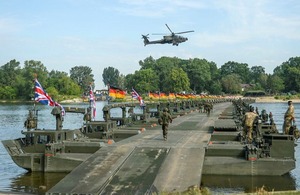Boost for British Armed Forces as UK and Germany sign major contract for next-generation bridging equipment
UK and Germany sign new contract for world-leading bridging equipment in latest milestone for landmark defence partnership

- British Army will be boosted with new high-tech bridging equipment to make troops more mobile on the battlefield.
- UK investing £200 million in new bridge and ferrying capability, with plans to also export a Stockport-built bridging system to Germany.
- Deal reflects deeper UK-Germany defence partnership, building on the UK-Germany bilateral treaty and one year on from signing of landmark Trinity House Agreement.
British soldiers’ mobility on the battlefield will be enhanced as the UK and Germany sign a major contract for new high-tech bridging equipment, reflecting the growing defence partnership between the two countries.
One year on from the signing of the Trinity House Agreement, a landmark agreement on defence between the two countries, the UK’s £200 million investment will see 36 large amphibious bridging vehicles, produced by General Dynamic European Land Systems (GDELS) in Germany, which help to transport troops and heavy equipment delivered to the British Army. These enable large military kit such as tanks or artillery units to cross rivers by forming floating bridges or ferrying them. Under the joint contract, Germany will also purchase a number of units to be delivered to its Army.
UK businesses are set to benefit from a similar plan for Germany to purchase the UK’s General Support Bridge (GSB) system. This allows troops to build a 46-metre sturdy bridge – the length of five buses – in less than 90 minutes, usable by all NATO tanks including the British Army’s future Challenger 3. The GSB is produced by KNDS UK in Stockport and supports 300 jobs, making defence an engine for growth across the UK in line with the Government’s Plan for Change.
The new M3 EVO system represents a significant upgrade for the UK’s Armed Forces, able to carry heavier loads and work better alongside our allies. The system will give them the flexibility needed to quickly cross large rivers or bodies of water over 100 meters wide. It will be capable of carrying all of the land equipment used by the British Army.
Minister for Defence Readiness and Industry, Luke Pollard MP, said:
This world-leading new system will better equip the British Army, helping our troops to be more effective on the battlefield. We are delivering on the Strategic Defence Review’s ambition to transform our Armed Forces as we face this new era of threat.
One year on from our landmark Trinity House defence agreement with Germany, we are working hand in hand to reinforce Europe and NATO’s collective security.
This initiative fulfils both countries’ commitments as allies to work together to provide robust bridging capability for NATO forces, in line with the Strategic Defence Review’s NATO-first approach.
The UK has stepped up with the largest sustained increase in defence spending since the end of the Cold War, which is increasing to 2.6% of GDP from 2027 with an ambition of hitting 3% by the end of next Parliament.
The new systems will replace the current M3 Amphibious Rigs, which have been in service for approximately 30 years, modernising UK military equipment to bolster national security in line with the Government’s Plan for Change. The equipment is expected to be rolled out in the early 2030s.
They will be operated by the British Army’s Royal Engineers as part of the joint UK-German Amphibious Engineer Battalion based in Minden, Germany, further enhancing the partnership between the two countries.
Colonel Adam Foley, British Army Lead for Military Engineering Capability, said:
This is an excellent example of close collaboration between the UK and Germany. This contract award further strengthens the Trinity House Agreement and the United Kingdom’s NATO commitments delivered through the multinational 130 Pioneer Battalion in cooperation with Germany.
Military bridging is the bedrock of successful operations. These new systems will enable the UK to maintain operational advantage by allowing commanders the freedom of manoeuvre they require on the battlefield. GDELS will manufacture these platforms for the British Army, delivering an enduring capability that will support all NATO armoured vehicles, including the UK’s Armoured Brigade Combat Teams set to be equipped with the Challenger 3 tank.
The M3 EVO contract strengthens the relationship between the UK and Germany, building upon the Trinity House Agreement signed in October last year, a first-of-its-kind commitment to deepening defence cooperation across all domains. This was further reinforced in July 2025, with Prime Minister Keir Starmer hosting German Chancellor Friedrich Merz to sign the Kensington Agreement on closer defence and industrial ties.
Defence Secretary John Healey hosted the German Defence Minister Boris Pistorius at RAF Lossiemouth last week to mark the anniversary of the Trinity House Agreement and to highlight ramping up of cooperation on joint cyber security and defensive activity.
The Organisation for Joint Armament Cooperation, which facilitates and manages collaborative armament programmes between the governments of Belgium, France, Germany, Italy, Spain, and the United Kingdom, signed the contract on behalf of the two countries.
UK National Armaments Director Rupert Pearce said:
The NAD Group exists to make global partnerships move faster and more effectively, superbly demonstrating what modern warfighting readiness looks like. British and German forces using top-quality NATO-standard equipment, UK industry exporting innovation, and our two nations standing together against the threats we face.